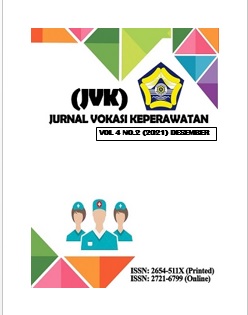Main Article Content
Abstract
The earthquake disaster not only caused casualties but also caused problems in the health sector, so strategic steps to minimize its impact included the knowledge and attitudes of puskesmas officers. The purpose of the study was to study the relationship between knowledge and attitudes with the preparedness of puskesmas officers to face earthquakes at Telaga Dewa Health Center, Bengkulu City. The research method uses an analytical survey design with a cross sectional approach. The population in this study were all puskesmas officers at the Telaga Dewa Health Center, Bengkulu City. The sample in this study was 70 officers, the sampling method used the Total Sampling technique. Collecting research data using primary data obtained from respondents by using a questionnaire to officers at the Telaga Dewa Health Center Bengkulu City. Data analysis was performed by univariate and bivariate, bivariate analysis using Chi-Square test and using the Contingency Coefficient test. The results of the study of the knowledge variable obtained the following results the value of asymp.sig (p) = 0.002. Because the p value < 0.05 then H0 is rejected. Ha is accepted, meaning that there is a relationship between knowledge and the preparedness of puskesmas officers in dealing with earthquake disasters. The attitude variable was obtained with the following results asymp.sig (p) = 0.007. Because p value < 0.05 then H0 is rejected. Ha is accepted, meaning that there is a relationship between attitude and preparedness of puskesmas officers in dealing with an earthquake in the Telaga Dewa Health Center area of Bengkulu City. From the results above, it can be concluded that the better the knowledge and attitude, the more prepared and alert a person is in dealing with earthquakes. It is hoped that the Telaga Dewa Health Center Agency of Bengkulu City, especially Puskesmas officers can provide training to puskesmas officers on disaster response.
Keywords
Article Details
References
- Bapeda Provinsi Bengkulu. 2002. Laporan Tahunan.
- BMKG. 2017. Database Gempa BMKG Kepahiang. BMKG Kepahiang, Bengkulu.
- BNPB. 2012. Menuju Indonesia Tangguh Menghadapi Tsunami. Jakarta: Badan Nasional Penanggulangan Bencana.
- BNPB. 2019. Indeks Resiko Bencana Indonesia Tahun 2019. Jakarta: Direktorat Pengurangan Risiko Bencana Deputi Bidang Pencegahan dan Kesiapsiagaan.
- Dinas ESDM Provinsi Bengkulu. 2003. RP4D Kota Bengkulu. Bengkulu. Dinas ESDM Provinsi Bengkulu.
- Heryana, A. 2020. Peran Kesmas Dalam Kesiapsiagaan Terhadap Bencana. Prodi Kesehatan Masyarakat Universitas Esa Unggul.
- Mawan. 2019. Hubunga Pengetahuan Dan Sikap Dengan Kesiapsiagaan Petugas Puskesmas Dalam Menghadapi Bencana Gempa Bumi Di Puskesmas Betungan Kota Bengkulu. Universitas Tri Mandiri Sakti: Bengkulu.
- Nasional, B., Bencana, P., Indonesia, R. B., Bencana, P., Nasional, B., & Bencana, P. (n.d.). I-1 skripsi adaptive village governance ... aisyah nusa ramadhana.
- Notoatmodjo, S. 2013. Pendidikan Dan Perilaku Kesehatan. Jakarta: PT Rineka Cipta.
- Nurdin. (2017). Kajian Risiko dan Aksi Adaptasi Perubahan Iklim Sektor Spesifik Ketahanan Pangan di Dusun Ngoro-Oro, Desa Giriasih, Kecamatan Purwosari. January.
- PPNI. 2013. The Role of The Public Health Nurse In Disaster (Preparedness, Response and Recovery). APHN Public Health Nurse Preparedness Committe.
- Yustisia, N., APRILATUTINI, T., & UTAMA, T. A. (2019). Pengaruh Simulasi Menghadapi Bencana Gempa Bumi Terhadap Kesiapsiagaan Siswa Sdn 86 Kota Bengkulu. Journal of Nursing and Public Health, 7(2), 32–38. https://doi.org/10.37676/jnph.v7i2.888
References
Bapeda Provinsi Bengkulu. 2002. Laporan Tahunan.
BMKG. 2017. Database Gempa BMKG Kepahiang. BMKG Kepahiang, Bengkulu.
BNPB. 2012. Menuju Indonesia Tangguh Menghadapi Tsunami. Jakarta: Badan Nasional Penanggulangan Bencana.
BNPB. 2019. Indeks Resiko Bencana Indonesia Tahun 2019. Jakarta: Direktorat Pengurangan Risiko Bencana Deputi Bidang Pencegahan dan Kesiapsiagaan.
Dinas ESDM Provinsi Bengkulu. 2003. RP4D Kota Bengkulu. Bengkulu. Dinas ESDM Provinsi Bengkulu.
Heryana, A. 2020. Peran Kesmas Dalam Kesiapsiagaan Terhadap Bencana. Prodi Kesehatan Masyarakat Universitas Esa Unggul.
Mawan. 2019. Hubunga Pengetahuan Dan Sikap Dengan Kesiapsiagaan Petugas Puskesmas Dalam Menghadapi Bencana Gempa Bumi Di Puskesmas Betungan Kota Bengkulu. Universitas Tri Mandiri Sakti: Bengkulu.
Nasional, B., Bencana, P., Indonesia, R. B., Bencana, P., Nasional, B., & Bencana, P. (n.d.). I-1 skripsi adaptive village governance ... aisyah nusa ramadhana.
Notoatmodjo, S. 2013. Pendidikan Dan Perilaku Kesehatan. Jakarta: PT Rineka Cipta.
Nurdin. (2017). Kajian Risiko dan Aksi Adaptasi Perubahan Iklim Sektor Spesifik Ketahanan Pangan di Dusun Ngoro-Oro, Desa Giriasih, Kecamatan Purwosari. January.
PPNI. 2013. The Role of The Public Health Nurse In Disaster (Preparedness, Response and Recovery). APHN Public Health Nurse Preparedness Committe.
Yustisia, N., APRILATUTINI, T., & UTAMA, T. A. (2019). Pengaruh Simulasi Menghadapi Bencana Gempa Bumi Terhadap Kesiapsiagaan Siswa Sdn 86 Kota Bengkulu. Journal of Nursing and Public Health, 7(2), 32–38. https://doi.org/10.37676/jnph.v7i2.888
